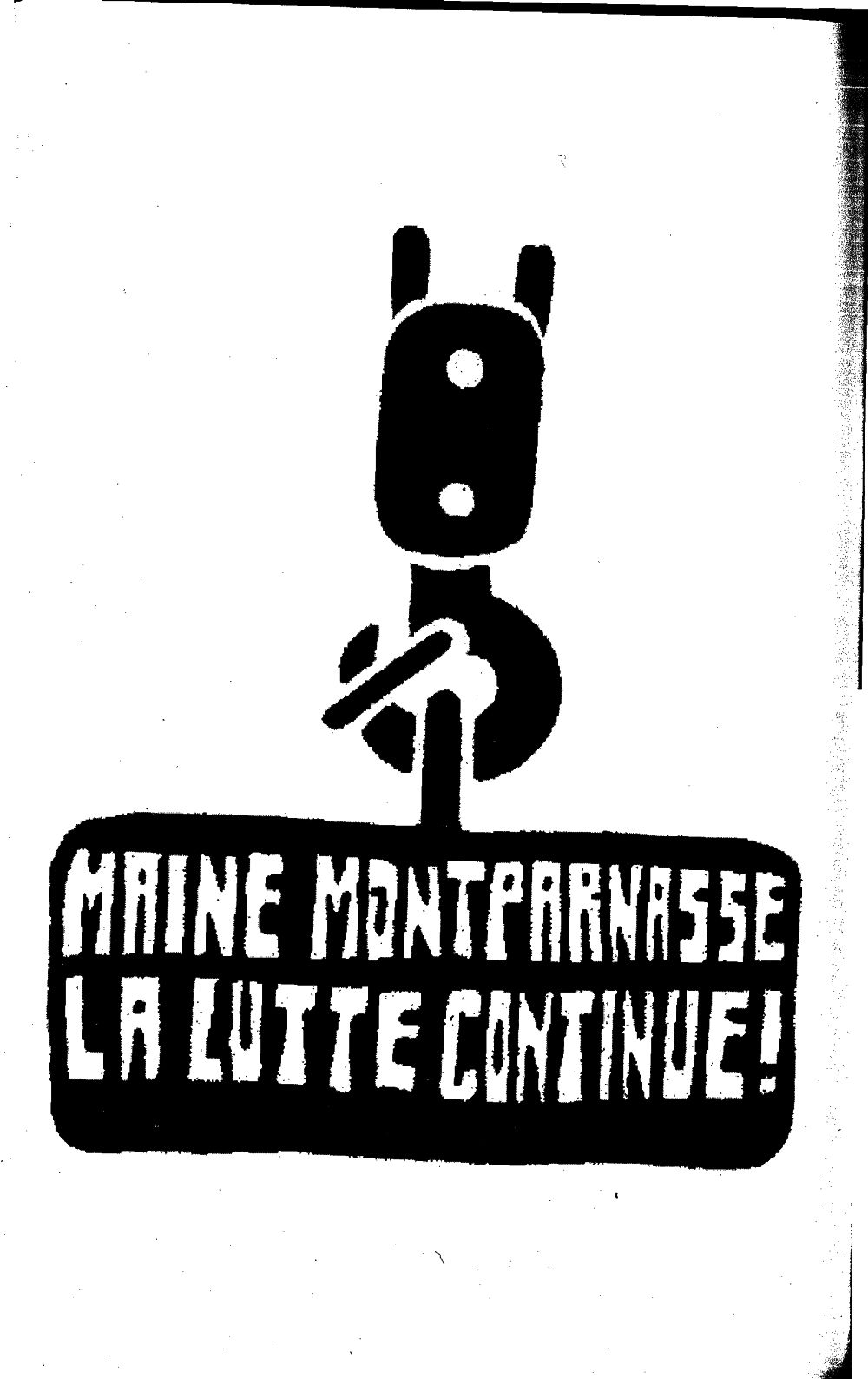When Poetry Ruled the Streets: Journal of a Neighborhood Action Committee (pages 13-16, Cahiers de mai no.2)
Thumbnail
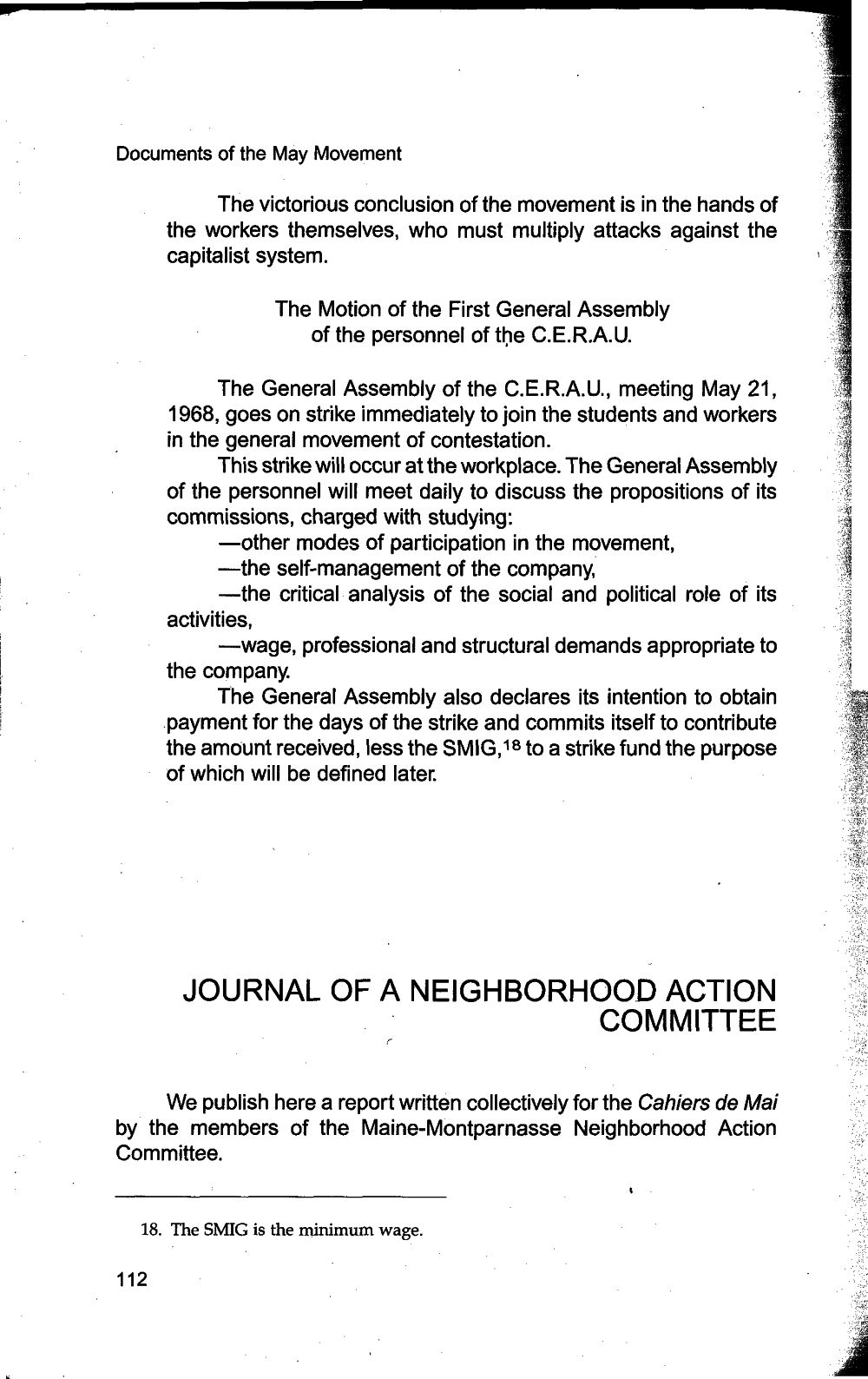

Documents of the May Movement
The victorious conclusion of the movement is in the hands of
the workers themselves, who must multiply attacks against the
capitalist system.
the workers themselves, who must multiply attacks against the
capitalist system.
The Motion of the First General Assembly
of the personnel of the C.E.RAU.
of the personnel of the C.E.RAU.
The General Assembly of the C.E.R.A.U., meeting May 21,
1968, goes on strike immediately to join the students and workers
in the general movement of contestation.
1968, goes on strike immediately to join the students and workers
in the general movement of contestation.
This strike will occur at the workplace. The General Assembly
of the personnel will meet daily to discuss the propositions of its
commissions, charged with studying:
of the personnel will meet daily to discuss the propositions of its
commissions, charged with studying:
—other modes of participation in the movement,
—the self-management of the company,
—the critical analysis of the social and political role of its
activities,
activities,
—wage, professional and structural demands appropriate to
the company.
the company.
The General Assembly also declares its intention to obtain
payment for the days of the strike and commits itself to contribute
the amount received, less the SMIG,18 to a strike fund the purpose
of which will be defined later.
payment for the days of the strike and commits itself to contribute
the amount received, less the SMIG,18 to a strike fund the purpose
of which will be defined later.
JOURNAL OF A NEIGHBORHOOD ACTION
COMMITTEE
We publish here a report written collectively for the Cahiers de Mai
by the members of the Maine-Montparnasse Neighborhood Action
Committee.
by the members of the Maine-Montparnasse Neighborhood Action
Committee.
18. The SMIG is the minimum wage.
112
112
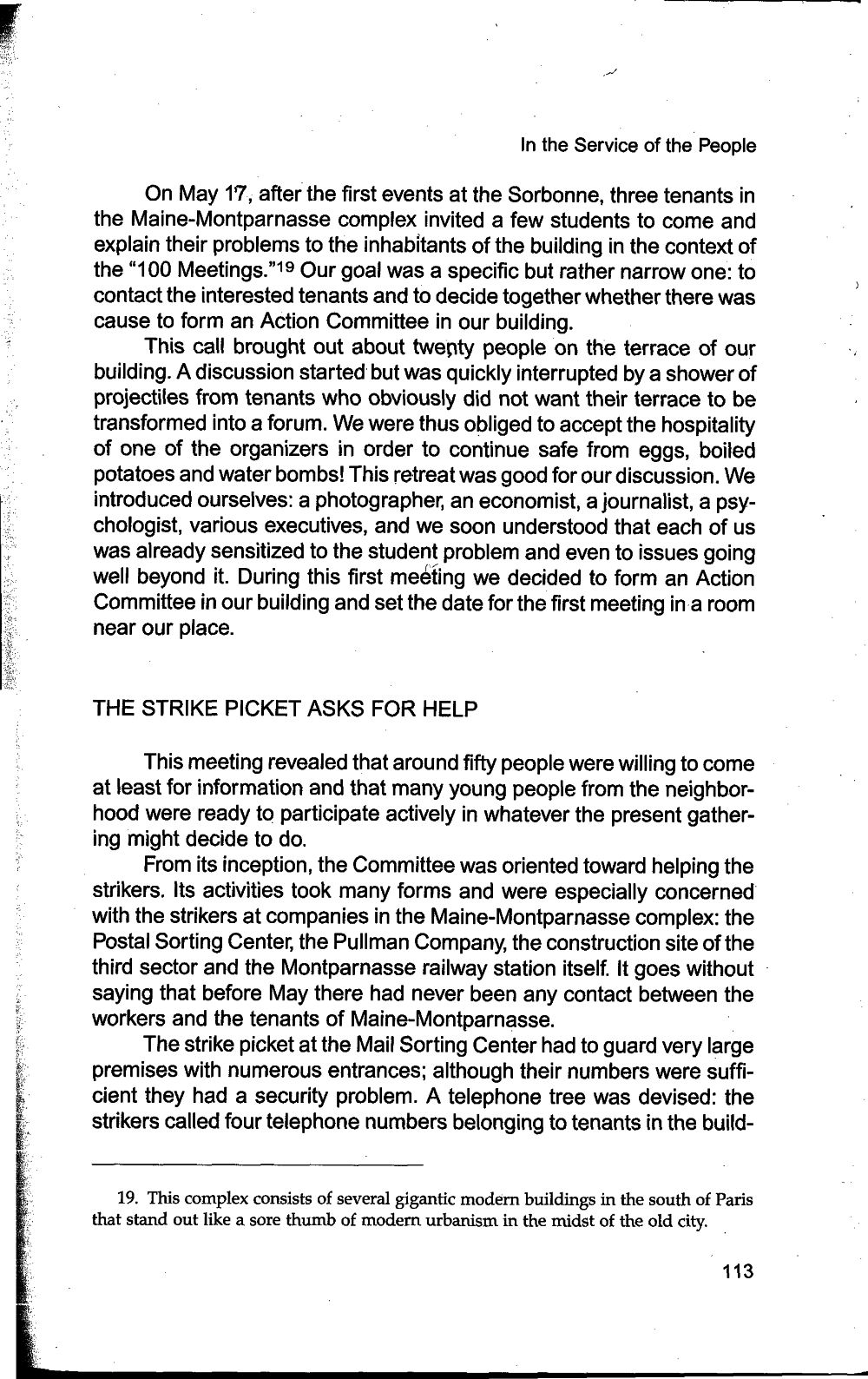

In the Service of the People
On May 17, after the first events at the Sorbonne, three tenants in
the Maine-Montparnasse complex invited a few students to come and
explain their problems to the inhabitants of the building in the context of
the "100 Meetings."19 Our goal was a specific but rather narrow one: to
contact the interested tenants and to decide together whether there was
cause to form an Action Committee in our building.
the Maine-Montparnasse complex invited a few students to come and
explain their problems to the inhabitants of the building in the context of
the "100 Meetings."19 Our goal was a specific but rather narrow one: to
contact the interested tenants and to decide together whether there was
cause to form an Action Committee in our building.
This call brought out about twepty people on the terrace of our
building. A discussion started but was quickly interrupted by a shower of
projectiles from tenants who obviously did not want their terrace to be
transformed into a forum. We were thus obliged to accept the hospitality
of one of the organizers in order to continue safe from eggs, boiled
potatoes and water bombs! This retreat was good for our discussion. We
introduced ourselves: a photographer, an economist, a journalist, a psy-
chologist, various executives, and we soon understood that each of us
was already sensitized to the student problem and even to issues going
well beyond it. During this first meeting we decided to form an Action
Committee in our building and set the date for the first meeting in a room
near our place.
building. A discussion started but was quickly interrupted by a shower of
projectiles from tenants who obviously did not want their terrace to be
transformed into a forum. We were thus obliged to accept the hospitality
of one of the organizers in order to continue safe from eggs, boiled
potatoes and water bombs! This retreat was good for our discussion. We
introduced ourselves: a photographer, an economist, a journalist, a psy-
chologist, various executives, and we soon understood that each of us
was already sensitized to the student problem and even to issues going
well beyond it. During this first meeting we decided to form an Action
Committee in our building and set the date for the first meeting in a room
near our place.
THE STRIKE PICKET ASKS FOR HELP
This meeting revealed that around fifty people were willing to come
at least for information and that many young people from the neighbor-
hood were ready to participate actively in whatever the present gather-
ing might decide to do.
at least for information and that many young people from the neighbor-
hood were ready to participate actively in whatever the present gather-
ing might decide to do.
From its inception, the Committee was oriented toward helping the
strikers. Its activities took many forms and were especially concerned
with the strikers at companies in the Maine-Montparnasse complex: the
Postal Sorting Center, the Pullman Company, the construction site of the
third sector and the Montparnasse railway station itself. It goes without
saying that before May there had never been any contact between the
workers and the tenants of Maine-Montparnasse.
strikers. Its activities took many forms and were especially concerned
with the strikers at companies in the Maine-Montparnasse complex: the
Postal Sorting Center, the Pullman Company, the construction site of the
third sector and the Montparnasse railway station itself. It goes without
saying that before May there had never been any contact between the
workers and the tenants of Maine-Montparnasse.
The strike picket at the Mail Sorting Center had to guard very large
premises with numerous entrances; although their numbers were suffi-
cient they had a security problem. A telephone tree was devised: the
strikers called four telephone numbers belonging to tenants in the build-
premises with numerous entrances; although their numbers were suffi-
cient they had a security problem. A telephone tree was devised: the
strikers called four telephone numbers belonging to tenants in the build-
19. This complex consists of several gigantic modern buildings in the south of Paris
that stand out like a sore thumb of modern urbanism in the midst of the old city.
that stand out like a sore thumb of modern urbanism in the midst of the old city.
113
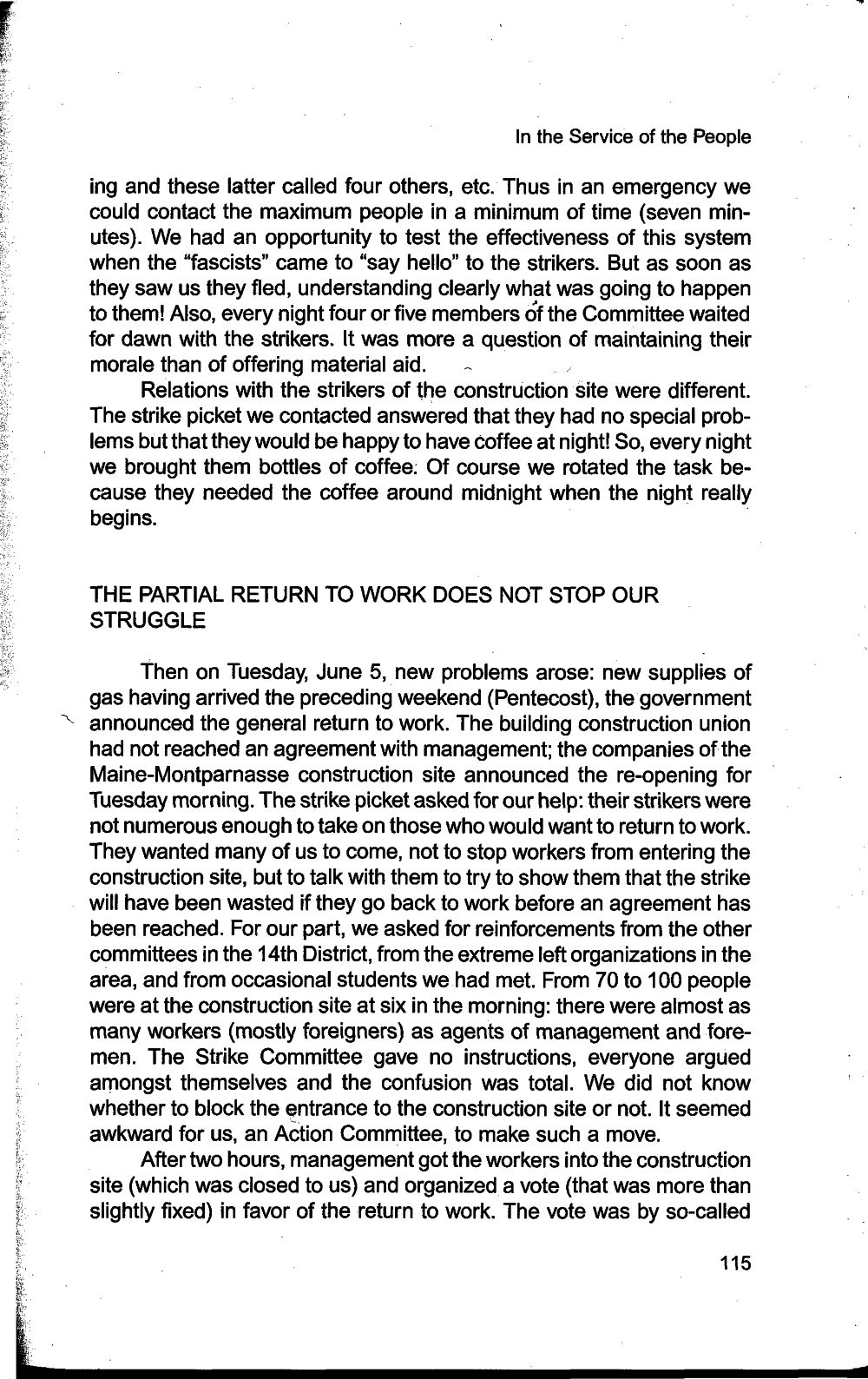

In the Service of the People
ing and these latter called four others, etc. Thus in an emergency we
could contact the maximum people in a minimum of time (seven min-
utes). We had an opportunity to test the effectiveness of this system
when the "fascists" came to "say hello" to the strikers. But as soon as
they saw us they fled, understanding clearly what was going to happen
to them! Also, every night four or five members of the Committee waited
for dawn with the strikers. It was more a question of maintaining their
morale than of offering material aid.
could contact the maximum people in a minimum of time (seven min-
utes). We had an opportunity to test the effectiveness of this system
when the "fascists" came to "say hello" to the strikers. But as soon as
they saw us they fled, understanding clearly what was going to happen
to them! Also, every night four or five members of the Committee waited
for dawn with the strikers. It was more a question of maintaining their
morale than of offering material aid.
Relations with the strikers of the construction site were different.
The strike picket we contacted answered that they had no special prob-
lems but that they would be happy to have coffee at night! So, every night
we brought them bottles of coffee. Of course we rotated the task be-
cause they needed the coffee around midnight when the night really
begins.
The strike picket we contacted answered that they had no special prob-
lems but that they would be happy to have coffee at night! So, every night
we brought them bottles of coffee. Of course we rotated the task be-
cause they needed the coffee around midnight when the night really
begins.
THE PARTIAL RETURN TO WORK DOES NOT STOP OUR
STRUGGLE
STRUGGLE
Then on Tuesday, June 5, new problems arose: new supplies of
gas having arrived the preceding weekend (Pentecost), the government
announced the general return to work. The building construction union
had not reached an agreement with management; the companies of the
Maine-Montparnasse construction site announced the re-opening for
Tuesday morning. The strike picket asked for our help: their strikers were
not numerous enough to take on those who would want to return to work.
They wanted many of us to come, not to stop workers from entering the
construction site, but to talk with them to try to show them that the strike
will have been wasted if they go back to work before an agreement has
been reached. For our part, we asked for reinforcements from the other
committees in the 14th District, from the extreme left organizations in the
area, and from occasional students we had met. From 70 to 100 people
were at the construction site at six in the morning: there were almost as
many workers (mostly foreigners) as agents of management and fore-
men. The Strike Committee gave no instructions, everyone argued
amongst themselves and the confusion was total. We did not know
whether to block the entrance to the construction site or not. It seemed
awkward for us, an Action Committee, to make such a move.
gas having arrived the preceding weekend (Pentecost), the government
announced the general return to work. The building construction union
had not reached an agreement with management; the companies of the
Maine-Montparnasse construction site announced the re-opening for
Tuesday morning. The strike picket asked for our help: their strikers were
not numerous enough to take on those who would want to return to work.
They wanted many of us to come, not to stop workers from entering the
construction site, but to talk with them to try to show them that the strike
will have been wasted if they go back to work before an agreement has
been reached. For our part, we asked for reinforcements from the other
committees in the 14th District, from the extreme left organizations in the
area, and from occasional students we had met. From 70 to 100 people
were at the construction site at six in the morning: there were almost as
many workers (mostly foreigners) as agents of management and fore-
men. The Strike Committee gave no instructions, everyone argued
amongst themselves and the confusion was total. We did not know
whether to block the entrance to the construction site or not. It seemed
awkward for us, an Action Committee, to make such a move.
After two hours, management got the workers into the construction
site (which was closed to us) and organized a vote (that was more than
slightly fixed) in favor of the return to work. The vote was by so-called
site (which was closed to us) and organized a vote (that was more than
slightly fixed) in favor of the return to work. The vote was by so-called
115
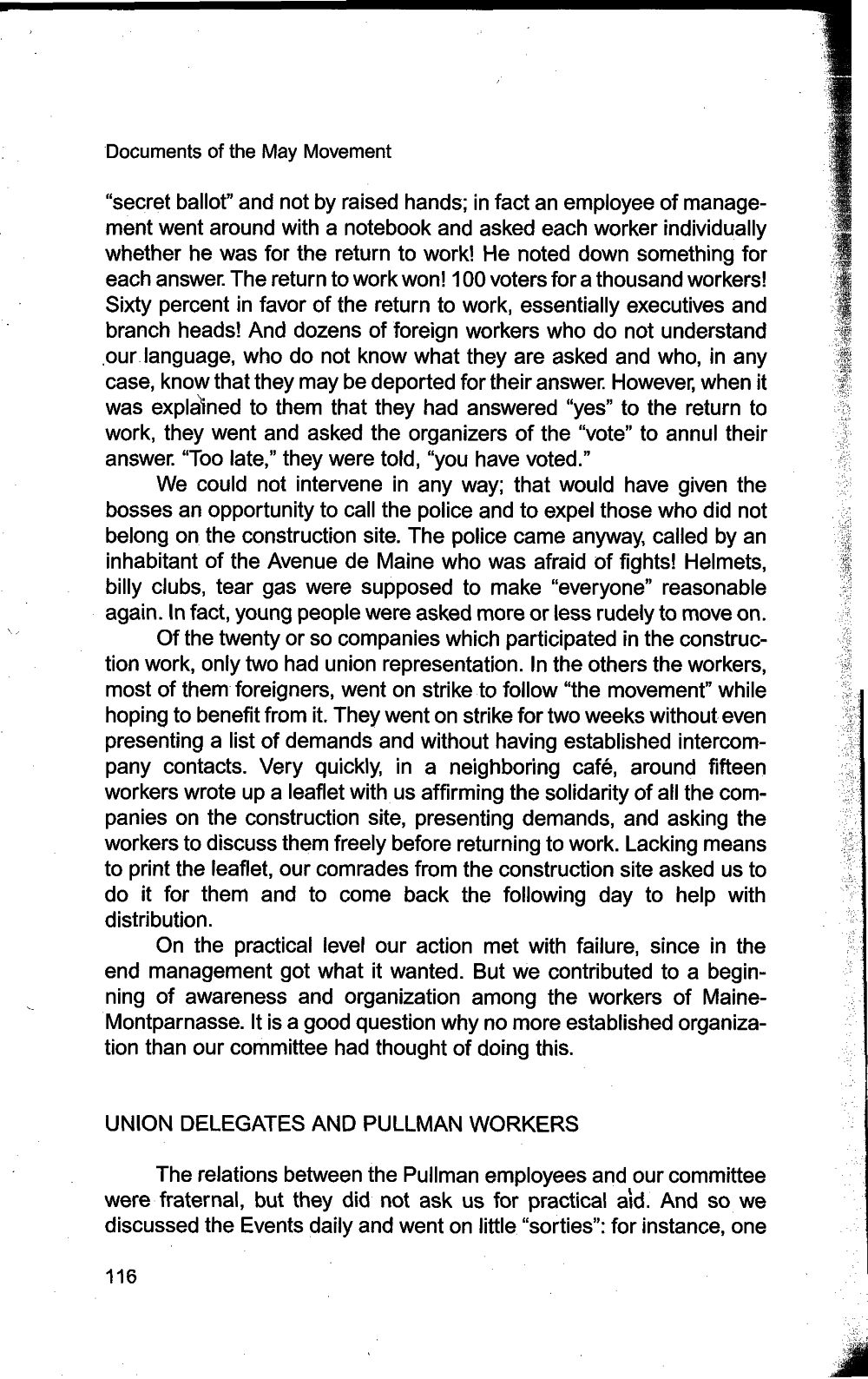

Documents of the May Movement
"secret ballot" and not by raised hands; in fact an employee of manage-
ment went around with a notebook and asked each worker individually
whether he was for the return to work! He noted down something for
each answer. The return to work won! 100 voters for a thousand workers!
Sixty percent in favor of the return to work, essentially executives and
branch heads! And dozens of foreign workers who do not understand
our language, who do not know what they are asked and who, in any
case, know that they may be deported for their answer. However, when it
was explained to them that they had answered "yes" to the return to
work, they went and asked the organizers of the "vote" to annul their
answer. "Too late," they were told, "you have voted."
ment went around with a notebook and asked each worker individually
whether he was for the return to work! He noted down something for
each answer. The return to work won! 100 voters for a thousand workers!
Sixty percent in favor of the return to work, essentially executives and
branch heads! And dozens of foreign workers who do not understand
our language, who do not know what they are asked and who, in any
case, know that they may be deported for their answer. However, when it
was explained to them that they had answered "yes" to the return to
work, they went and asked the organizers of the "vote" to annul their
answer. "Too late," they were told, "you have voted."
We could not intervene in any way; that would have given the
bosses an opportunity to call the police and to expel those who did not
belong on the construction site. The police came anyway, called by an
inhabitant of the Avenue de Maine who was afraid of fights! Helmets,
billy clubs, tear gas were supposed to make "everyone" reasonable
again. In fact, young people were asked more or less rudely to move on.
bosses an opportunity to call the police and to expel those who did not
belong on the construction site. The police came anyway, called by an
inhabitant of the Avenue de Maine who was afraid of fights! Helmets,
billy clubs, tear gas were supposed to make "everyone" reasonable
again. In fact, young people were asked more or less rudely to move on.
Of the twenty or so companies which participated in the construc-
tion work, only two had union representation. In the others the workers,
most of them foreigners, went on strike to follow "the movement" while
hoping to benefit from it. They went on strike for two weeks without even
presenting a list of demands and without having established intercom-
pany contacts. Very quickly, in a neighboring cafe, around fifteen
workers wrote up a leaflet with us affirming the solidarity of all the com-
panies on the construction site, presenting demands, and asking the
workers to discuss them freely before returning to work. Lacking means
to print the leaflet, our comrades from the construction site asked us to
do it for them and to come back the following day to help with
distribution.
tion work, only two had union representation. In the others the workers,
most of them foreigners, went on strike to follow "the movement" while
hoping to benefit from it. They went on strike for two weeks without even
presenting a list of demands and without having established intercom-
pany contacts. Very quickly, in a neighboring cafe, around fifteen
workers wrote up a leaflet with us affirming the solidarity of all the com-
panies on the construction site, presenting demands, and asking the
workers to discuss them freely before returning to work. Lacking means
to print the leaflet, our comrades from the construction site asked us to
do it for them and to come back the following day to help with
distribution.
On the practical level our action met with failure, since in the
end management got what it wanted. But we contributed to a begin-
ning of awareness and organization among the workers of Maine-
Montparnasse. It is a good question why no more established organiza-
tion than our committee had thought of doing this.
end management got what it wanted. But we contributed to a begin-
ning of awareness and organization among the workers of Maine-
Montparnasse. It is a good question why no more established organiza-
tion than our committee had thought of doing this.
UNION DELEGATES AND PULLMAN WORKERS
The relations between the Pullman employees and our committee
were fraternal, but they did not ask us for practical aid. And so we
discussed the Events daily and went on little "sorties": for instance, one
were fraternal, but they did not ask us for practical aid. And so we
discussed the Events daily and went on little "sorties": for instance, one
116
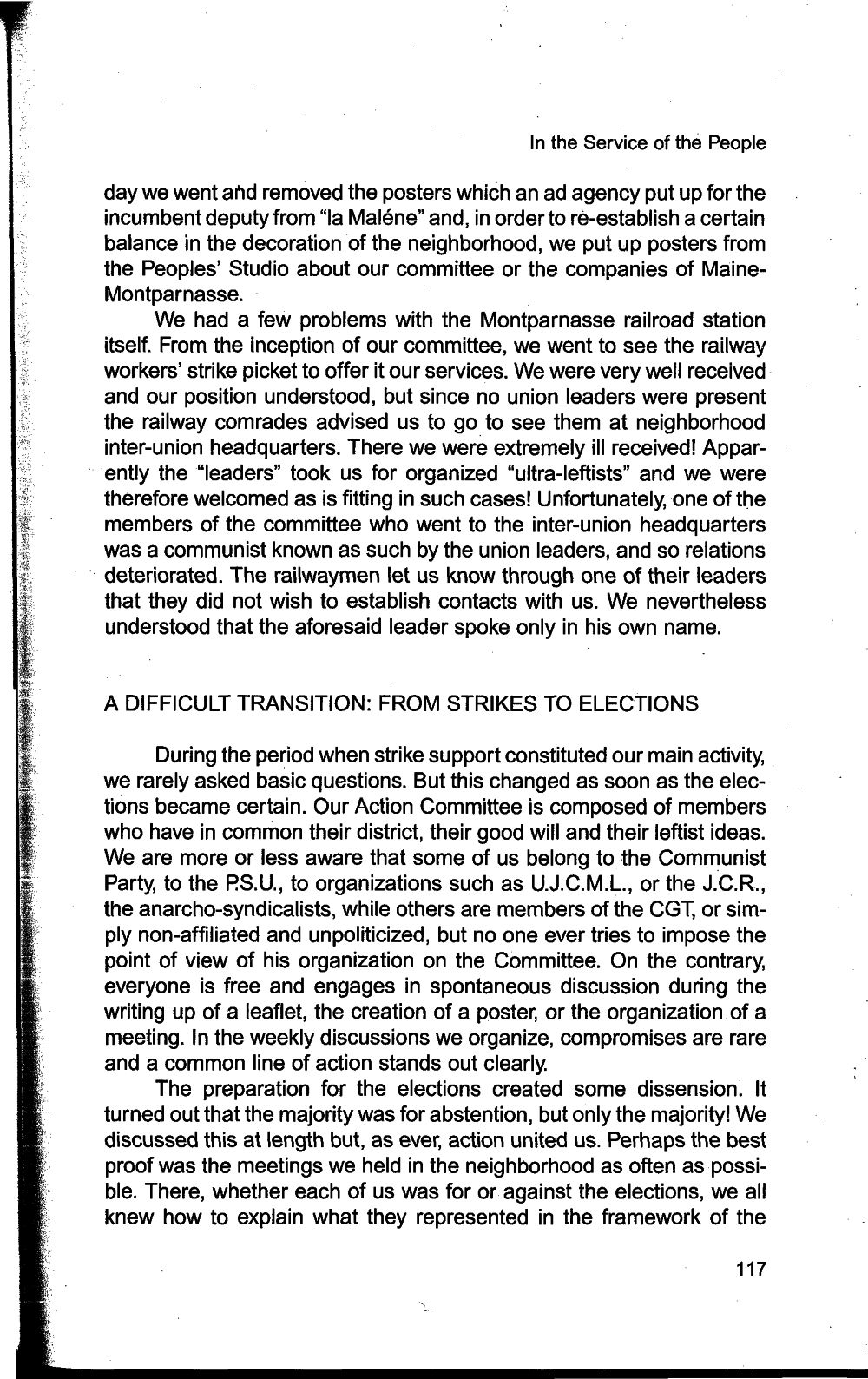

In the Service of the People
day we went and removed the posters which an ad agency put up for the
incumbent deputy from "la Malene" and, in order to re-establish a certain
balance in the decoration of the neighborhood, we put up posters from
the Peoples' Studio about our committee or the companies of Maine-
Montparnasse.
incumbent deputy from "la Malene" and, in order to re-establish a certain
balance in the decoration of the neighborhood, we put up posters from
the Peoples' Studio about our committee or the companies of Maine-
Montparnasse.
We had a few problems with the Montparnasse railroad station
itself. From the inception of our committee, we went to see the railway
workers' strike picket to offer it our services. We were very well received
and our position understood, but since no union leaders were present
the railway comrades advised us to go to see them at neighborhood
inter-union headquarters. There we were extremely ill received! Appar-
ently the "leaders" took us for organized "ultra-leftists" and we were
therefore welcomed as is fitting in such cases! Unfortunately, one of the
members of the committee who went to the inter-union headquarters
was a communist known as such by the union leaders, and so relations
deteriorated. The railwaymen let us know through one of their leaders
that they did not wish to establish contacts with us. We nevertheless
understood that the aforesaid leader spoke only in his own name.
itself. From the inception of our committee, we went to see the railway
workers' strike picket to offer it our services. We were very well received
and our position understood, but since no union leaders were present
the railway comrades advised us to go to see them at neighborhood
inter-union headquarters. There we were extremely ill received! Appar-
ently the "leaders" took us for organized "ultra-leftists" and we were
therefore welcomed as is fitting in such cases! Unfortunately, one of the
members of the committee who went to the inter-union headquarters
was a communist known as such by the union leaders, and so relations
deteriorated. The railwaymen let us know through one of their leaders
that they did not wish to establish contacts with us. We nevertheless
understood that the aforesaid leader spoke only in his own name.
A DIFFICULT TRANSITION: FROM STRIKES TO ELECTIONS
During the period when strike support constituted our main activity,
we rarely asked basic questions. But this changed as soon as the elec-
tions became certain. Our Action Committee is composed of members
who have in common their district, their good will and their leftist ideas.
We are more or less aware that some of us belong to the Communist
Party, to the RS.U., to organizations such as U.J.C.M.L., or the J.C.R.,
the anarcho-syndicalists, while others are members of the CGT, or sim-
ply non-affiliated and unpoliticized, but no one ever tries to impose the
point of view of his organization on the Committee. On the contrary,
everyone is free and engages in spontaneous discussion during the
writing up of a leaflet, the creation of a poster, or the organization of a
meeting. In the weekly discussions we organize, compromises are rare
and a common line of action stands out clearly.
we rarely asked basic questions. But this changed as soon as the elec-
tions became certain. Our Action Committee is composed of members
who have in common their district, their good will and their leftist ideas.
We are more or less aware that some of us belong to the Communist
Party, to the RS.U., to organizations such as U.J.C.M.L., or the J.C.R.,
the anarcho-syndicalists, while others are members of the CGT, or sim-
ply non-affiliated and unpoliticized, but no one ever tries to impose the
point of view of his organization on the Committee. On the contrary,
everyone is free and engages in spontaneous discussion during the
writing up of a leaflet, the creation of a poster, or the organization of a
meeting. In the weekly discussions we organize, compromises are rare
and a common line of action stands out clearly.
The preparation for the elections created some dissension. It
turned out that the majority was for abstention, but only the majority! We
discussed this at length but, as ever, action united us. Perhaps the best
proof was the meetings we held in the neighborhood as often as possi-
ble. There, whether each of us was for or against the elections, we all
knew how to explain what they represented in the framework of the
turned out that the majority was for abstention, but only the majority! We
discussed this at length but, as ever, action united us. Perhaps the best
proof was the meetings we held in the neighborhood as often as possi-
ble. There, whether each of us was for or against the elections, we all
knew how to explain what they represented in the framework of the
117
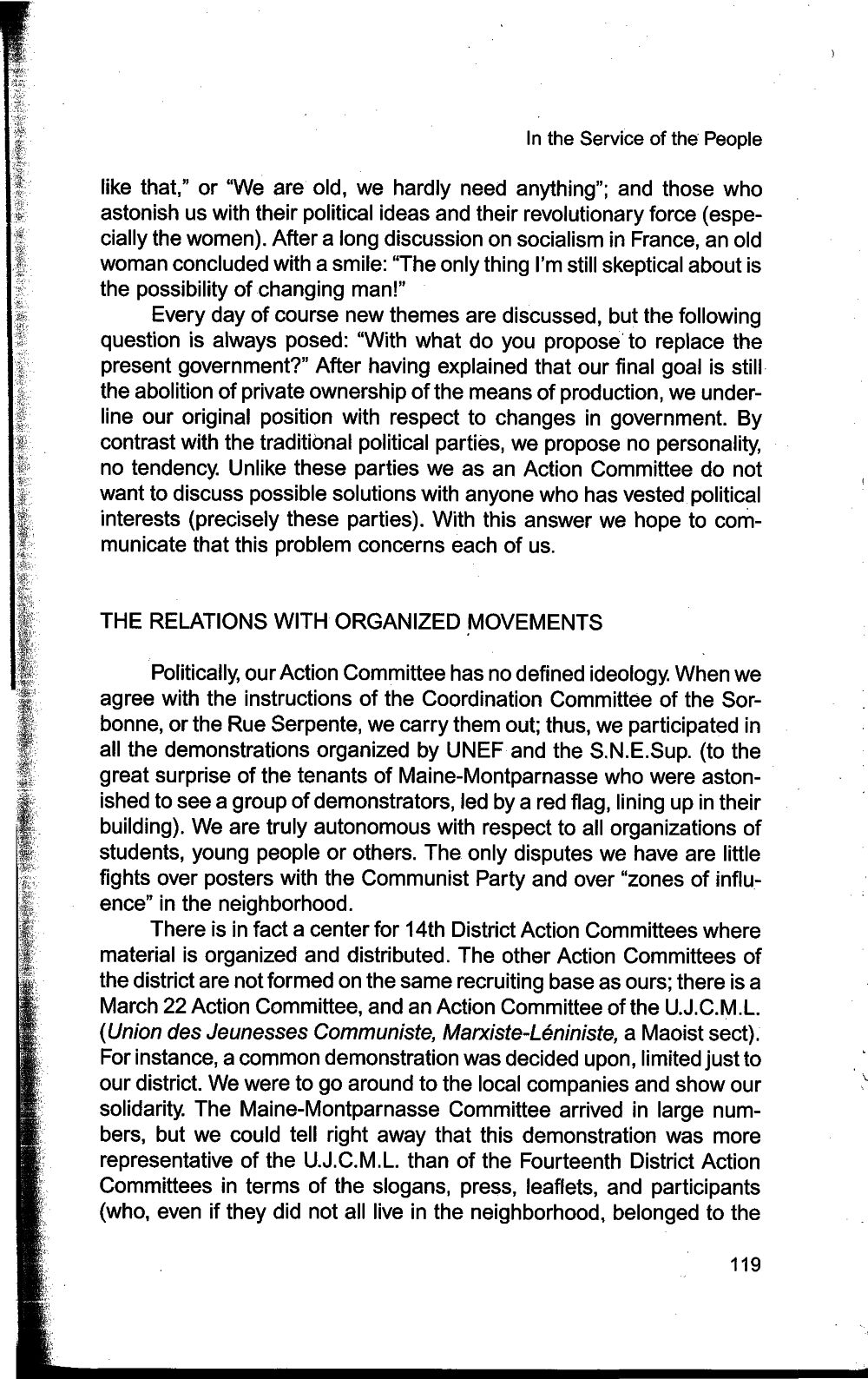

In the Service of the People
like that," or "We are old, we hardly need anything"; and those who
astonish us with their political ideas and their revolutionary force (espe-
cially the women). After a long discussion on socialism in France, an old
woman concluded with a smile: "The only thing I'm still skeptical about is
the possibility of changing man!"
astonish us with their political ideas and their revolutionary force (espe-
cially the women). After a long discussion on socialism in France, an old
woman concluded with a smile: "The only thing I'm still skeptical about is
the possibility of changing man!"
Every day of course new themes are discussed, but the following
question is always posed: "With what do you propose to replace the
present government?" After having explained that our final goal is still
the abolition of private ownership of the means of production, we under-
line our original position with respect to changes in government. By
contrast with the traditional political parties, we propose no personality,
no tendency. Unlike these parties we as an Action Committee do not
want to discuss possible solutions with anyone who has vested political
interests (precisely these parties). With this answer we hope to com-
municate that this problem concerns each of us.
question is always posed: "With what do you propose to replace the
present government?" After having explained that our final goal is still
the abolition of private ownership of the means of production, we under-
line our original position with respect to changes in government. By
contrast with the traditional political parties, we propose no personality,
no tendency. Unlike these parties we as an Action Committee do not
want to discuss possible solutions with anyone who has vested political
interests (precisely these parties). With this answer we hope to com-
municate that this problem concerns each of us.
THE RELATIONS WITH ORGANIZED MOVEMENTS
Politically, our Action Committee has no defined ideology. When we
agree with the instructions of the Coordination Committee of the Sor-
bonne, or the Rue Serpente, we carry them out; thus, we participated in
all the demonstrations organized by UNEF and the S.N.E.Sup. (to the
great surprise of the tenants of Maine-Montparnasse who were aston-
ished to see a group of demonstrators, led by a red flag, lining up in their
building). We are truly autonomous with respect to all organizations of
students, young people or others. The only disputes we have are little
fights over posters with the Communist Party and over "zones of influ-
ence" in the neighborhood.
agree with the instructions of the Coordination Committee of the Sor-
bonne, or the Rue Serpente, we carry them out; thus, we participated in
all the demonstrations organized by UNEF and the S.N.E.Sup. (to the
great surprise of the tenants of Maine-Montparnasse who were aston-
ished to see a group of demonstrators, led by a red flag, lining up in their
building). We are truly autonomous with respect to all organizations of
students, young people or others. The only disputes we have are little
fights over posters with the Communist Party and over "zones of influ-
ence" in the neighborhood.
There is in fact a center for 14th District Action Committees where
material is organized and distributed. The other Action Committees of
the district are not formed on the same recruiting base as ours; there is a
March 22 Action Committee, and an Action Committee of the U.J.C.M.L.
(Union des Jeunesses Communiste, Marxiste-Leniniste, a Maoist sect).
For instance, a common demonstration was decided upon, limited just to
our district. We were to go around to the local companies and show our
solidarity. The Maine-Montparnasse Committee arrived in large num-
bers, but we could tell right away that this demonstration was more
representative of the U.J.C.M.L. than of the Fourteenth District Action
Committees in terms of the slogans, press, leaflets, and participants
(who, even if they did not all live in the neighborhood, belonged to the
material is organized and distributed. The other Action Committees of
the district are not formed on the same recruiting base as ours; there is a
March 22 Action Committee, and an Action Committee of the U.J.C.M.L.
(Union des Jeunesses Communiste, Marxiste-Leniniste, a Maoist sect).
For instance, a common demonstration was decided upon, limited just to
our district. We were to go around to the local companies and show our
solidarity. The Maine-Montparnasse Committee arrived in large num-
bers, but we could tell right away that this demonstration was more
representative of the U.J.C.M.L. than of the Fourteenth District Action
Committees in terms of the slogans, press, leaflets, and participants
(who, even if they did not all live in the neighborhood, belonged to the
119
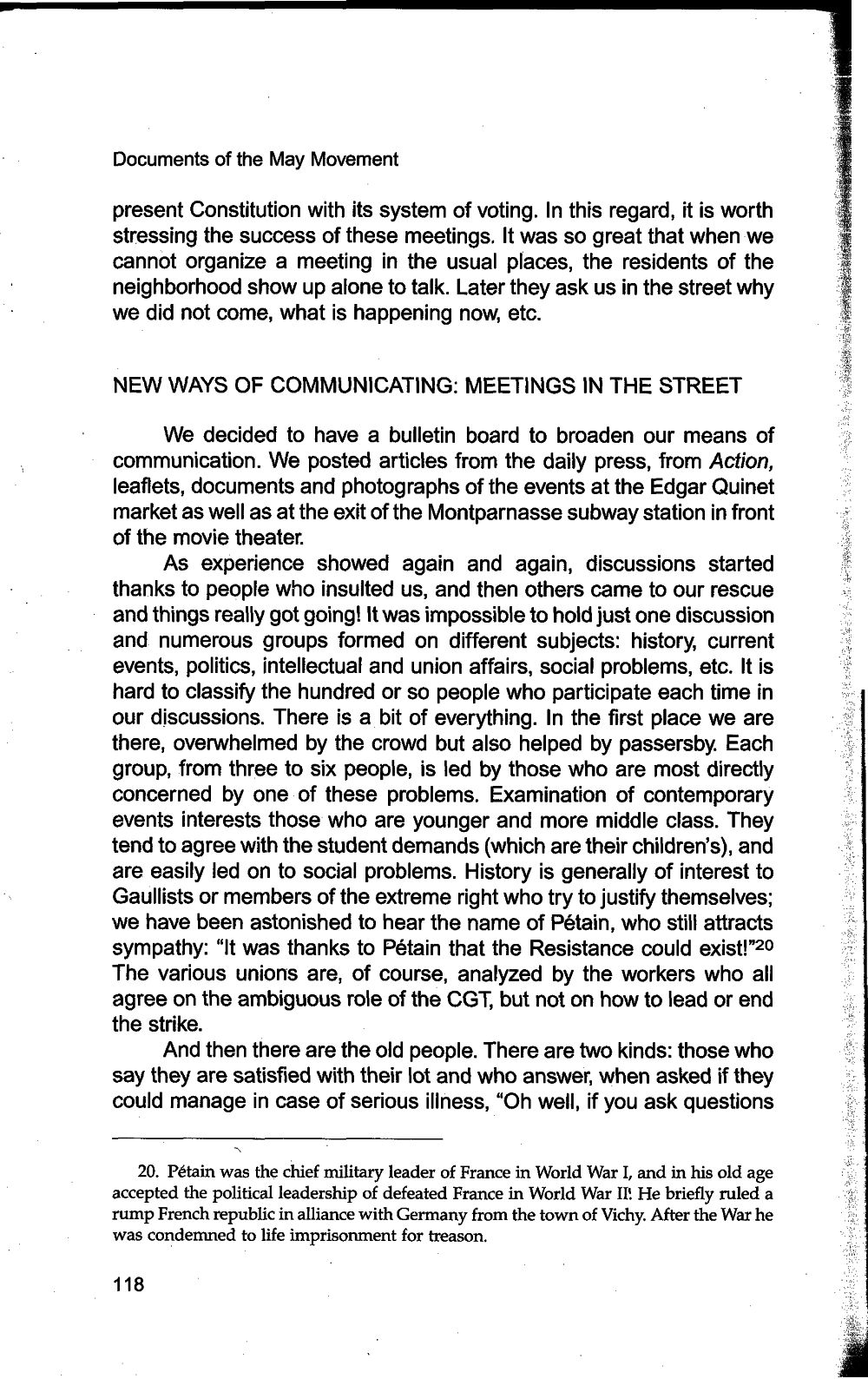

Documents of the May Movement
present Constitution with its system of voting. In this regard, it is worth
stressing the success of these meetings. It was so great that when we
cannot organize a meeting in the usual places, the residents of the
neighborhood show up alone to talk. Later they ask us in the street why
we did not come, what is happening now, etc.
stressing the success of these meetings. It was so great that when we
cannot organize a meeting in the usual places, the residents of the
neighborhood show up alone to talk. Later they ask us in the street why
we did not come, what is happening now, etc.
NEW WAYS OF COMMUNICATING: MEETINGS IN THE STREET
We decided to have a bulletin board to broaden our means of
communication. We posted articles from the daily press, from Action,
leaflets, documents and photographs of the events at the Edgar Quinet
market as well as at the exit of the Montparnasse subway station in front
of the movie theater.
communication. We posted articles from the daily press, from Action,
leaflets, documents and photographs of the events at the Edgar Quinet
market as well as at the exit of the Montparnasse subway station in front
of the movie theater.
As experience showed again and again, discussions started
thanks to people who insulted us, and then others came to our rescue
and things really got going! It was impossible to hold just one discussion
and numerous groups formed on different subjects: history, current
events, politics, intellectual and union affairs, social problems, etc. It is
hard to classify the hundred or so people who participate each time in
our discussions. There is a bit of everything. In the first place we are
there, overwhelmed by the crowd but also helped by passersby. Each
group, from three to six people, is led by those who are most directly
concerned by one of these problems. Examination of contemporary
events interests those who are younger and more middle class. They
tend to agree with the student demands (which are their children's), and
are easily led on to social problems. History is generally of interest to
Gaullists or members of the extreme right who try to justify themselves;
we have been astonished to hear the name of Retain, who still attracts
sympathy: "It was thanks to Retain that the Resistance could exist!"20
The various unions are, of course, analyzed by the workers who all
agree on the ambiguous role of the CGT, but not on how to lead or end
the strike.
thanks to people who insulted us, and then others came to our rescue
and things really got going! It was impossible to hold just one discussion
and numerous groups formed on different subjects: history, current
events, politics, intellectual and union affairs, social problems, etc. It is
hard to classify the hundred or so people who participate each time in
our discussions. There is a bit of everything. In the first place we are
there, overwhelmed by the crowd but also helped by passersby. Each
group, from three to six people, is led by those who are most directly
concerned by one of these problems. Examination of contemporary
events interests those who are younger and more middle class. They
tend to agree with the student demands (which are their children's), and
are easily led on to social problems. History is generally of interest to
Gaullists or members of the extreme right who try to justify themselves;
we have been astonished to hear the name of Retain, who still attracts
sympathy: "It was thanks to Retain that the Resistance could exist!"20
The various unions are, of course, analyzed by the workers who all
agree on the ambiguous role of the CGT, but not on how to lead or end
the strike.
And then there are the old people. There are two kinds: those who
say they are satisfied with their lot and who answer, when asked if they
could manage in case of serious illness, "Oh well, if you ask questions
say they are satisfied with their lot and who answer, when asked if they
could manage in case of serious illness, "Oh well, if you ask questions
20. Petain was the chief military leader of France in World War I, and in his old age
accepted the political leadership of defeated France in World War IE He briefly ruled a
rump French republic in alliance with Germany from the town of Vichy. After the War he
was condemned to life imprisonment for treason.
accepted the political leadership of defeated France in World War IE He briefly ruled a
rump French republic in alliance with Germany from the town of Vichy. After the War he
was condemned to life imprisonment for treason.
118
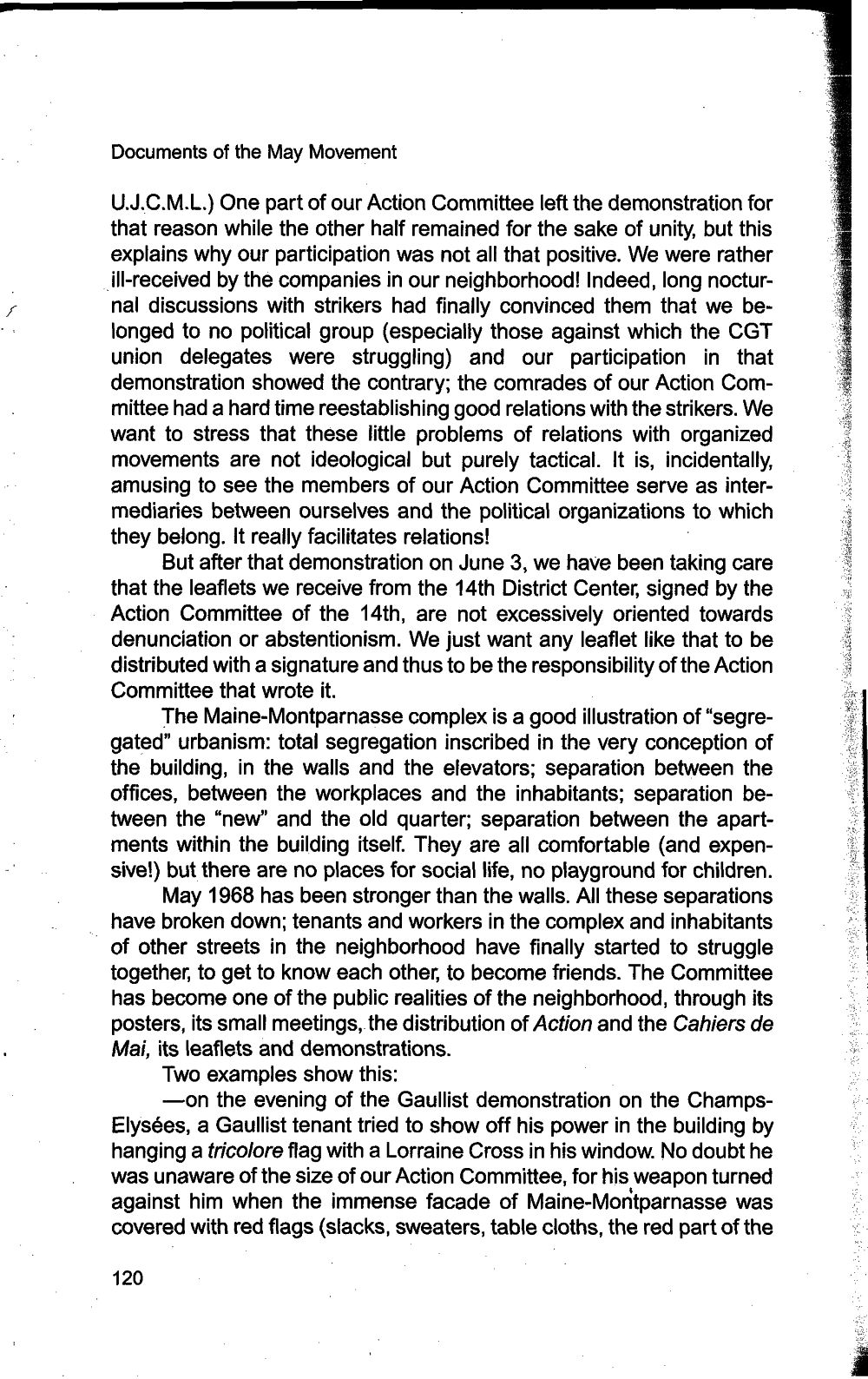

Documents of the May Movement
U.J.C.M.L) One part of our Action Committee left the demonstration for
that reason while the other half remained for the sake of unity, but this
explains why our participation was not all that positive. We were rather
ill-received by the companies in our neighborhood! Indeed, long noctur-
nal discussions with strikers had finally convinced them that we be-
longed to no political group (especially those against which the CGT
union delegates were struggling) and our participation in that
demonstration showed the contrary; the comrades of our Action Com-
mittee had a hard time reestablishing good relations with the strikers. We
want to stress that these little problems of relations with organized
movements are not ideological but purely tactical. It is, incidentally,
amusing to see the members of our Action Committee serve as inter-
mediaries between ourselves and the political organizations to which
they belong. It really facilitates relations!
that reason while the other half remained for the sake of unity, but this
explains why our participation was not all that positive. We were rather
ill-received by the companies in our neighborhood! Indeed, long noctur-
nal discussions with strikers had finally convinced them that we be-
longed to no political group (especially those against which the CGT
union delegates were struggling) and our participation in that
demonstration showed the contrary; the comrades of our Action Com-
mittee had a hard time reestablishing good relations with the strikers. We
want to stress that these little problems of relations with organized
movements are not ideological but purely tactical. It is, incidentally,
amusing to see the members of our Action Committee serve as inter-
mediaries between ourselves and the political organizations to which
they belong. It really facilitates relations!
But after that demonstration on June 3, we have been taking care
that the leaflets we receive from the 14th District Center, signed by the
Action Committee of the 14th, are not excessively oriented towards
denunciation or abstentionism. We just want any leaflet like that to be
distributed with a signature and thus to be the responsibility of the Action
Committee that wrote it.
that the leaflets we receive from the 14th District Center, signed by the
Action Committee of the 14th, are not excessively oriented towards
denunciation or abstentionism. We just want any leaflet like that to be
distributed with a signature and thus to be the responsibility of the Action
Committee that wrote it.
The Maine-Montparnasse complex is a good illustration of "segre-
gated" urbanism: total segregation inscribed in the very conception of
the building, in the walls and the elevators; separation between the
offices, between the workplaces and the inhabitants; separation be-
tween the "new" and the old quarter; separation between the apart-
ments within the building itself. They are all comfortable (and expen-
sive!) but there are no places for social life, no playground for children.
gated" urbanism: total segregation inscribed in the very conception of
the building, in the walls and the elevators; separation between the
offices, between the workplaces and the inhabitants; separation be-
tween the "new" and the old quarter; separation between the apart-
ments within the building itself. They are all comfortable (and expen-
sive!) but there are no places for social life, no playground for children.
May 1968 has been stronger than the walls. All these separations
have broken down; tenants and workers in the complex and inhabitants
of other streets in the neighborhood have finally started to struggle
together, to get to know each other, to become friends. The Committee
has become one of the public realities of the neighborhood, through its
posters, its small meetings, the distribution of Action and the Cahiers de
Mai, its leaflets and demonstrations.
have broken down; tenants and workers in the complex and inhabitants
of other streets in the neighborhood have finally started to struggle
together, to get to know each other, to become friends. The Committee
has become one of the public realities of the neighborhood, through its
posters, its small meetings, the distribution of Action and the Cahiers de
Mai, its leaflets and demonstrations.
Two examples show this:
—on the evening of the Gaullist demonstration on the Champs-
Elysees, a Gaullist tenant tried to show off his power in the building by
hanging a tricolors flag with a Lorraine Cross in his window. No doubt he
was unaware of the size of our Action Committee, for his weapon turned
against him when the immense facade of Maine-Montparnasse was
covered with red flags (slacks, sweaters, table cloths, the red part of the
Elysees, a Gaullist tenant tried to show off his power in the building by
hanging a tricolors flag with a Lorraine Cross in his window. No doubt he
was unaware of the size of our Action Committee, for his weapon turned
against him when the immense facade of Maine-Montparnasse was
covered with red flags (slacks, sweaters, table cloths, the red part of the
120

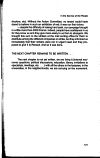
In the Service of the People
tricolore, etc). -Without the Action Committee, no tenant would have
dared to believe in such an exhibition of red; it was our first victory.
dared to believe in such an exhibition of red; it was our first victory.
—despite the difficulty of raising hard cash, our campaign brought
in a little more than 2000 Francs. Indeed, people have confidence in us
for they know us and they give more easily to us than to strangers. We
brought this sum to the strikers at the mail sorting office for them to
distribute among the different companies on strike, but they informed us
immediately that their strikers were not in urgent need and they pro-
posed to give it to Renault. And so it was done.
in a little more than 2000 Francs. Indeed, people have confidence in us
for they know us and they give more easily to us than to strangers. We
brought this sum to the strikers at the mail sorting office for them to
distribute among the different companies on strike, but they informed us
immediately that their strikers were not in urgent need and they pro-
posed to give it to Renault. And so it was done.
THE NEXT CHAPTER REMAINS TO BE WRITTEN . . .
The next chapter is not yet written, we are living it (internal eco-
nomic questions, political discussions, education, library, invitations to
specialists, meetings, etc.. . .) with all the others in the factories, in the
universities, in the neighborhoods; we are carrying on the movement.
nomic questions, political discussions, education, library, invitations to
specialists, meetings, etc.. . .) with all the others in the factories, in the
universities, in the neighborhoods; we are carrying on the movement.
121
Category
Title
When Poetry Ruled the Streets: Journal of a Neighborhood Action Committee (pages 13-16, Cahiers de mai no.2)
Issue
pp. 112-121
Date
Unknown
Translation of
Keywords
Publication information
pp. 112-121
